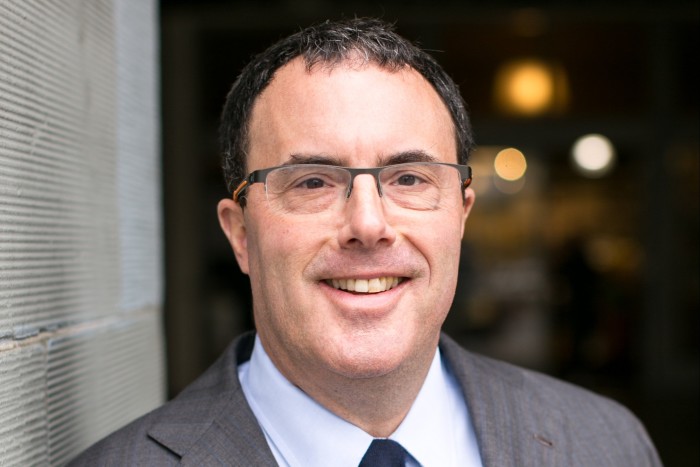Pete Briger, co-founder of Fortress Investment Group, said a sharp contraction in credit due to the banking crisis and rising interest rates would trigger a wave of defaults. The asset manager’s own employees.
In an interview with the Financial Times, Brig said the expected market turmoil created the best opportunity for investors in distressed assets since the 2008 financial crisis. So now is a good time for Fortress employees to buy the firm, which specializes in distressed debt and other debt-based investment strategies and has $46 billion in assets.
“The amount of credit in the world right now is falling every day . . . making it harder for companies to borrow. The banking system itself is going through a restructuring as fractional reserve banks no longer operate in their current form,” Brig said.
“Asset values have taken a lot of damage, especially in real estate, growth equity and venture capital,” he added.
On Monday morning, SoftBank announced the sale of the US-based investment group to Mubadala Capital and Fortress Management, subsidiaries of one of Abu Dhabi’s sovereign wealth funds.
Mubadala will buy 70% of Fortress, while insiders such as Briger will buy the remaining 30%. Fortress employees will control the company’s board and have the ability to become majority shareholders for years to come, depending on the group’s financial performance.

While terms of the deal were not disclosed, the Financial Times previously reported that Mubadala and Fortress management would pay as much as $3 billion, down from the $3.3 billion SoftBank paid to take the company private in 2017. Fortress and Mubadala declined to comment on the pricing of the deal.
SoftBank’s acquisition of Fortress in 2017 came as founder Masayoshi Son tried to build an asset management unit within the Japanese investment group. But SoftBank’s huge interest in Chinese e-commerce giant Alibaba led U.S. regulators to rule in 2018 that the two companies could not integrate.
Briger said the distanced partnership was “good all along,” but once SoftBank started raising its own Vision Fund, “they weren’t interested in us anymore” and “were not strategic.”
In August, SoftBank said it would consider selling Fortress after substantial investment losses in its Vision fund.
“They’re interested in selling for their own unique reasons,” Briger said, noting that upcoming investment opportunities make now “a great time to buy a company like ours.”
During sale talks, Fortress told investors it was “in charge of its own destiny” and could ensure the deal was structured so as not to hurt investment performance, the Financial Times previously reported.
The acquisition will create opportunities for all Fortress employees to own part of the group and facilitate succession planning. Briger and Fortress co-founder Wes Edens will step down as co-CEO, and managing partners Drew McKnight and Joshua Pack will become co-CEOs.

Briger said the succession is designed to provide more leadership opportunities for a new generation of Fortress investors, and he will become chairman, oversee personnel issues and remain on Fortress’ investment committee.
“I could start my own fund within the firm . . . I’m definitely not retiring to play golf,” Brig said. “I probably won’t have the final say on 400 emails a day.”
Edens, who leads Fortress’ private equity practice, will continue to oversee legacy investments such as the 2007 acquisition of a Florida rail line that has been transformed into a high-speed commuter rail network called Brightline.
Fortress was the first major private equity firm to go public, in early 2007. As Blackstone, KKR, Apollo and Carlyle finally all went public, it sparked a similar wave of releases.
But Fortress’ buyout arm has struggled, as overleveraged deals such as its takeover of ski operator Intrawest soured during the crisis. Fortress’ private equity business has raised no new buyout funds since the crisis.
Its credit unit has grown under Briger’s watch, though not as fast as rivals such as Blackstone. Credit assets under management have grown from $24 billion at the time of the SoftBank acquisition to $42 billion today.
The group has invested heavily during the pandemic and has rolled out a range of strategies tailored to litigation financing, intellectual property and investments for wealthy individual investors. Fortress is also raising a new flagship fund for “opportunistic” investing and investing in non-performing loans in Europe.
Briger said Fortress’ cautious approach to attracting new assets in recent years would be an advantage because higher interest rates would cause problems for many competitors.
“There really wasn’t an opportunity in the last 10 years,” Briger said of debt-based investment opportunities. “But there are also some companies that have become outrageously large at the wrong time in the cycle.
“I think we’re going to get bigger in this environment. I think the companies that got bigger in credit and mezzanine credit probably regret it.”


